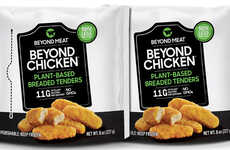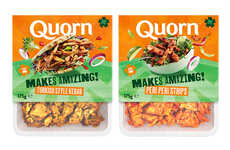
Beyond Meat Creates Vegan Chicken Strips
Michael Hines — June 14, 2012 — Lifestyle
References: beyondmeat & dvice
Beyond Meat is a new type of vegan offering that promises to have the consistency, look and taste of real meat. Beyond Meat was developed by entrepreneur Ethan Brown, in conjunction with Fu-hung Hsieh and Harold Huff. The three met at the University of Missouri, combining their knowledge to create their amazing imitation meat.
There are many ingredients that go into the creation of Beyond Meat, including soy, pea, carrot and gluten-free flour. The end result, after much time in the lab, is a strip of artificial meat with the taste and look of chicken. The vegan chicken meat is meant to appeal to vegans who appreciate the taste of meat, and to meat eaters who want to go vegan, but have a tough time dropping meat altogether. This faux chicken strip already has a big name backer in the form of Twitter's Biz Stone, so there's a chance that it may be able to do some big things.
There are many ingredients that go into the creation of Beyond Meat, including soy, pea, carrot and gluten-free flour. The end result, after much time in the lab, is a strip of artificial meat with the taste and look of chicken. The vegan chicken meat is meant to appeal to vegans who appreciate the taste of meat, and to meat eaters who want to go vegan, but have a tough time dropping meat altogether. This faux chicken strip already has a big name backer in the form of Twitter's Biz Stone, so there's a chance that it may be able to do some big things.
Trend Themes
1. Faux Meat - Developing imitation meat products that closely resemble the taste and texture of real meat.
2. Vegan-friendly - Creating meat alternatives that cater to the growing vegan population, providing them with new options that mimic the flavors they miss.
3. Plant-based Protein - Exploring the use of plant-based ingredients to develop protein-rich meat substitutes that have a lower environmental impact.
Industry Implications
1. Food and Beverage - The food industry can capitalize on the trend of faux meat by introducing more innovative plant-based meat substitutes that cater to different dietary preferences.
2. Culinary Innovation - The culinary industry can leverage the demand for vegan-friendly options to create innovative recipes and dishes that showcase the versatility of plant-based protein.
3. Sustainable Agriculture - The agriculture industry can explore the production of plant-based protein sources to support the demand for environmentally friendly meat alternatives, reducing the reliance on traditional livestock farming.
0.6
Score
Popularity
Activity
Freshness























